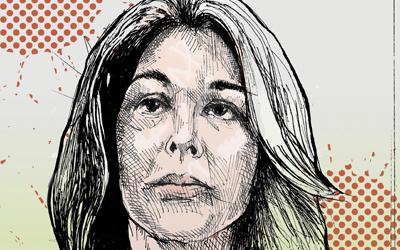Photo Credit: Lynne Foster
On October 11, 2015, Canadian journalist and activist Naomi Klein spoke at the LBJ School of Public Affairs about the connection between environmentalism and economic struggles around the world. During the previous evening UT-Austin hosted two screenings of the documentary “This Changes Everything”, a film directed by Klein’s husband Avi Lewis, which serves as a complement to her 2014 book bearing the same title. Having previously written books dealing mainly with political and economic justice, Klein said that she turned to climate change due to her realization that issues related to climate change are intimately bound up with questions of economic inequality and the ability of different groups to influence government policy.
According to Klein, humanity has historically been beholden to nature – for example, if someone wanted to sail a ship they had to wait until the winds were favorable. But with the advent of fossil fuels, humans have been able to overcome these nature-based obstacles (ships with engines can sail in any weather). Humans have thus developed the feeling that they are the masters of nature, entitled to exploit its resources as they wish. But as Klein argues, this sense of mastery over nature has only ever been an illusion, as seen by the increasing intensity and frequency of natural disasters such as Hurricane Sandy and the recent May floods in Austin. She called for humans to once again work with the natural world rather than against it in order to tackle climate change.
Going beyond environmentalist discourse around “polar bears and glaciers,” Klein highlighted how the extraction and burning of fossil fuels has been a threat to the economic livelihoods and physical health of communities living all over the world, from Canada to China. The “This Changes Everything” project celebrates the efforts of activists in these communities to confront these economic forces through direct action. She touted Germany as a prime example of what such activism could achieve: in large part because of its strong environmental justice movement, Germany currently gets about 30 percent of its energy from renewable sources and the energy utilities in many of its cities are publicly-owned cooperatives. Thus Klein demonstrated how actions to combat climate change can also be used to decentralize economic and political power. Even the Chinese government, in the face of large protests supporting action on the country’s pollution problem, has been working to phase out coal production in favor of solar power and other renewable technologies.
With reference to her previous book “The Shock Doctrine”, Klein noted how policymakers and corporations could potentially take advantage of crises like natural disasters to undermine democracy and economic equality. But she said that while climate change doesn’t always feel like an immediate crisis, its solutions could instead be used to strengthen democracy and build a fairer economy. She joked that conservatives, who have so often feared and resisted taking climate change seriously, understand what is needed to address climate change better than many liberals: a restructuring of the world’s free-market economy. Klein also discussed the concept of a “procrastination penalty”, contending that the longer governments fail to take meaningful action on climate change, the more drastic future solutions will need to be. Such actions, constituting a “Marshall Plan for the earth”, might include a carbon tax to fund a transition to sustainable infrastructure like public transportation, and compensating developing countries for “leapfrogging” over fossil fuels and using renewable energy to grow their economies. These policies require collective action and strong government intervention, both of which contradict the ethos of neoliberal economics that has persisted in the world economy since the 1980s.
Klein identified the recent decline in the global oil prices as a critical window of opportunity. Oil companies may decide that, as the price of oil becomes lower than the cost of extracting it and environmentalist activism continues to undermine their brand images, it may be better to change course and pursue renewable energy. Offering hope to the many progressives in the audience, she pointed out how some governments who prioritize fossil fuels are also facing political backlash: in May, the Canadian province of Alberta (often thought of as “Canada’s Texas” because of its strong oil and gas industry and its conservative political culture) voted out their Conservative government after over forty years of one-party dominance.
This public talk was followed by a smaller, student-centered discussion the next day. Students voiced their perception of a disconnect between a technocratic, policymaking class, largely composed of affluent and well-educated individuals, and a grassroots class that had fewer resources to influence government even though they had a more personal stake in the effects of government decisions. As they too were being trained to enter the technocratic class through their higher education, students wondered how they could bridge the gap between these two sectors to build a better society. Klein urged students to be more active in building alliances with underrepresented communities, and suggested the Canadian Leap Manifesto as a possible model. Based on Klein and Lewis’ work, it appears that policymakers should pay more attention to the constituencies they serve, but also that both the state and the grassroots are necessary to collectively solve a problem as large as climate change.

